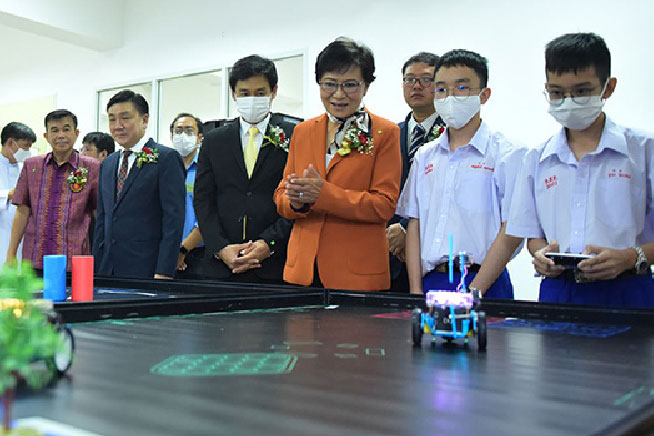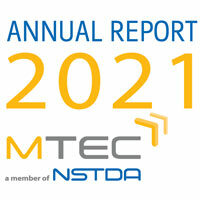Throughout the first half of the year 2021, the COVID-19 situation had continued to escalate and creates obstacles for operations. Thus, a new work style (New Normal) was inevitable. MTEC, however, committed to deliver research results that meet the country’s urgent needs, and, at the same time, created positive socio-economic impacts. Noted examples are as follows.
> The Patient Isolation and Transportation Chamber (PETE)
Dr. Sarawut Lerspalungsanti, Research Team Leader of Design and Industry Solutions Research Team, Engineering Design and Computation Research Group, and his research team had developed the ‘PETE’ (Patient Isolation and Transportation Chamber) to cope with the spread of the pathogens during a patient transfer. This medical device helps reduce the chance of the spread of infection to various medical equipment and air conditioning systems within the hospitals. The PETE unit can be put into an X-ray machine or a CT scanner since it does not contain any metal part and it can be easily handled and reinstalled, especially in the ambulance. Furthermore, its price is 3 times lower than those imported from abroad.
As of September 2021, MTEC had delivered the ‘PETE’ to 25 hospitals, namely, the Faculty of Medicine, Ramathibodi Hospital, Chulabhorn Hospital, Banphaeo General Hospital, the Golden Jubilee Medical Center, the Faculty of Medicine Siriraj Hospital, Thammasat University Field Hospital, Thammasat University, Hospital, Saint Mary’s Hospital, Ruam Nam Jai Foundation Khlong Toei, Vibhavadi Hospital, Erawan Field Hospital 2, Klang Hospital, Faculty of Medicine Vajira Hospital, Navamindradhiraj University, Ratchaphiphat Hospital, the National Institute for Emergency Medicine, Saint Louis Hospital, Phonthong Hospital, the Neurological Institute of Thailand, Venerable Thawisak Jutinhdaro Hospital, Taksin Hospital, Bangkok Metropolitan Administration Lat Krabang Hospital, Sirindhorn Hospital, Bang Khun Thian Senior hospital, Bangphai Hospital, Wang Chan hospital, and Sirindhorn Science Home Field Hospital for the disabilities. In this regard, Matichon Group and Bangkok Expressway and Metro Public Company Limited (BEM) had donated 10 units of PETE to the first 5 hospitals on the list.
MTEC had signed a licensing agreement of the PETE with Suprera Innovation Co., Ltd. to be the sole licensee for the technology transfer of the PETE’s production and distribution. The company would provide services and support medical personnel in the country, as well as further support the commercialization of research products from Thai researchers.
The PETE had passed International Electro Technical Commission (IEC) 60601-1 (safety), the IEC 60601-1-2 (electromagnetic compatibility of medical devices, EMC), and the ISO 14644 (clean room performance testing).
>> A remote-controlled delivery cart ‘Aree’
Dr.Korkiat Sedchaicharn, Researcher, and the research team of Design and Industry Solutions Research Team, Engineering Design and Computation Research Group together with Boon Engineering Co., Ltd. had developed a remote-controlled delivery cart ‘Aree’ to support the medical personnel in delivering food or drugs to the COVID-19 patients. This device could help reduce the chance of the spread of infection and the cost of personal protective equipment (PPE).
A remote-controlled delivery cart ‘Aree’ had passed International Electro Technical Commission (IEC) 60601-1-2 from the Electrical and Electronic Products Testing Center (PTEC), with no interference to the medical equipment, and its technology had been transferred to the manufacturers.
As of September 2021, there were 80 hospitals that received the remote-controlled delivery cart ‘Aree’. The complete list of the name of these hospitals is as follows: Pranangklao Hospital, Charoenkrung Pracharak Hospital, Taksin Hospital, Bangpakong Hospital, Wechkaroonrasm Hospital, the Neurological Institute of Thailand, the Princess Mother National Institute on Drug Abuse Treatment (PMNIDAT), Uthong Hospital, Uthai Hospital, Angthong Hospital, Venerable Thawisak Jutinhdaro Hospital, Sampran Hospital, Samkhok Hospital, Sattahip KM.10 Hospital, Saraburi Hospital, Somdejprasangkharach XVII Hospital, Sathing Phra Hospital, Satun Hospital, Srisangworn Sukhothai Hospital, Sisaket Hospital, Srinagarind Hospital, Faculty of Medicine, Khon Kaen University, Srinagarind Panyanandha Bhikkhu Hospital, Warinchamrab Hospital, Wat Yannasamvaram Hospital, Lamonthi Hospital, Lamlukka Hospital, Lamphun Hospital, Bangkok Metropolitan Administration Lat Krabang Hospital, Ratchaphiphat Hospital, Ranod Hospital, Yala Hospital, Maesai Hospital, Mae Moh Hospital, Mettapracharak Watraikhing Hospital, Photharam Hospi-tal, Phetchabun Hospital,Phutthamonthon Hospital, Phatthalung Hospital, Pattananikom Hospital, Kingnarai Hospital, Phra Nakhon Si Ayutthaya Hospital, Phrachomklao Hospital, Phromphiram Hospital, Phanatnikhom Hospital, Bang Khun Thian Senior Hospital, Pattani Hospital, Pranburi Hospital, Pathum Thani hospital, Banmi Hospital, Banpong Hospital, Bannasan Hospital, Bangyai Hospital, Bang Pa-in Hospital, Bang Pahan Hospital, Na Mom Hospital, Nopparat Rajathanee Hospital, Nakornping Hospital, Nakhon Phanom Hospital, Nakhon Pathom Hospital, Thanyaburi Hospital, Thoeng Hospital, Thepha Hospital, Tha luang Hospital, Thasala Hospital, Thawung Hospital, Takbai Hospital, Damnoen Saduak Hospital, Chiangrai Prachanukroh Hospital, Chai Badan Hospital, Chet Samian Hospital, Sakaeo Rajanakagrindra psychiatric hospital, Thepsatree Srisoonthorn Hospital, Khlong Luang Hospital, Khlong Sam Wa Hospital, KhonKaen Hospital, Koh Kha Hospital, Kamphaeng Phet Hospital, Kalasin Hospital, Bangkok Metropolitan Administration General Hospital, and Krathum Baen Hospital, and 5 field hospitals, namely, Nongsue Hospital, Field Hospital for the Disabled, Sirindhorn Science Home, Mongkutwattana General Hospital, Pamok Hospital, and Prachathipat Hospital.
>> RT-Wheelchair (An x-ray wheelchair for patients)
Dr. Danu Prommin, Research Team Leader, Mr. Parinya Junhunee, Senior Engineer of Biomechanics Research Team of Biofunctional Materials and Devices Research Group, and the Allied Health Science, Naresuan University had designed and developed the RT-Wheelchair with a unique design for the patient’s body. A critical part of this medical device is made of carbon fiber, a material that does not diminish the quality of radiation. The RT-Wheelchair is safe for patients and has a compartment for radiographs that can be moved throughout each specified location of the wheelchair. It can be reclined, thus supporting most configurations of routine x-ray imaging for all parts of the body. The RT-Wheelchair can also help reduce injuries during the patient care transfer to an X-ray bed, which is considered to be a major problem of x-ray imaging and x-ray diagnosis.
The RT-Wheelchair has passed the electrical standards for medical devices IEC 60601-1 and IEC 60601-1-2 certified by the Electrical and Electronic Products Testing Center (PTEC).
MTEC had delivered the RT-Wheelchair to Charoenkrung Pracharak Hospital and Banphaeo General Hospital for the medical personnel to accommodate all parts of the body for the relocation of the COVID-19 patients to help limit the spread of infection during patient care transfer and X-rays examination, as well as the problem of repetitive injuries that may occur during the transfer. The use of RT-Wheelchair had been demonstrated and training for the medical personnel of the hospital had been provided by the research team.
Research results and development for Thai youth curriculum
MTEC also places importance on science and engineering education and has cooperated with Assumption College Thonburi in the curriculum development for Thai youth in the development of AI skills by developing robotics and artificial intelligence skills for secondary school students. The Engineering Design and Computation Research Group has incorporated robotics, sensor technology, and artificial intelligence with a regular curriculum to enhance the skills and knowledge of Thai youth. These knowledge and skills can be put into practice in their daily life and become a basis for their career in the future. These activities also promote the education in robotics and artificial intelligence by focusing on practicality and in-depth studies, thus encouraging Deep Tech Innovation in Thailand. It is expected that some of these student will be able to develop advanced technology and start a Deep Tech Startup with high competency in the future.
>> A Projectile Ball Shooter as a Project-based Learning Tool (projectile)
A projectile ball shooter is developed to facilitate the Thai teachers and their students to adopt the robotics technology as a tool for a project-based learning approach. The design and development of the shooter will encourage students to be interested in applying knowledge in many fields, such as physics and mathematics, to integrate seamlessly with computer, mechanical and electrical engineering. The teachers and students has learnt to apply microcontrollers with various sensors, thus applying theories to a practical application by working on a hands-on experiment.
>> Garden of STEM
This device is a teaching prototype that students can learn to grow plants with a hydroponics system. Various factors that affect the plant growth, such as water content, fertilizer, humidity, temperature, and RGB light, can be controlled conforming to the experimental conditions. This activity gives students an opportunity to learn how each factor affect plant growth by collecting data from various sensors, learning programing skills, and applying different types of sensors to measure and systematically collect data. The learning process will help them to deeply understand the benefits and methods of using technology to enhance business in the community and encourage students to apply technology for smart farming. The benefits of this approach are to increase the use of digital technology in modern agriculture and enhance the productivity and competitiveness of entrepreneurs in agricultural industry in the long term.

Other research results and development
>> Mobile Salon V.2
Dr. Chatrchai Chandenduang, Senior Researcher, the Design and Industry Solutions Research Team of the Engineering Design and Computation Research Group of MTEC and Prasat Neurological Institute had cooperated in the testing of Mobile Salon. The main objective of this equipment is to reduce the burden of the medical personnel from washing the hair of bedridden patients. Mobile Salon V.1 has been field-tested with more than 100 patients, and improved into Mobile Salon V.2. In the near future, MTEC and Prasat Neurological Institute plan to further develop a ready-to-use innovative prototype for commercial use.
Hosting visitors
On October 7-8, 2020, The National Metal and Materials Technology Center (MTEC) had organized a research exhibition to welcome entrepreneurs from Smart Innovation Entrepreneur in Medical Engineering Industry project, Thammasat University. In this event, Dr. Jintamai Suwanprateeb, Director of Biofunctional Materials and Devices Research Group, had given a welcome speech and provided information on the research in the exhibition.
